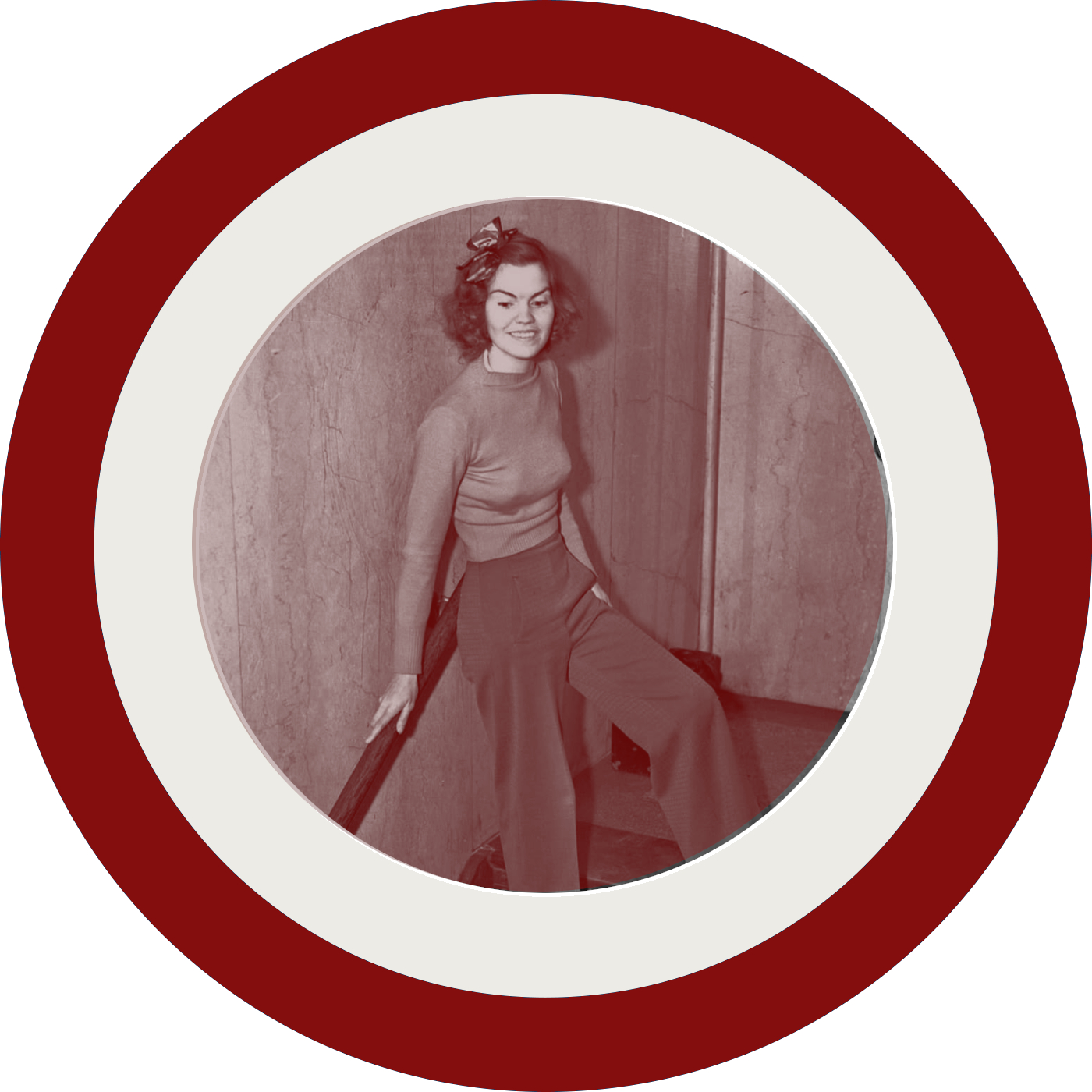Episode 230: Helen Hulick Takes the Stand
Order The Memory Palace book now, dear listener. On Bookshop.org, on Amazon.com, on Barnes & Noble, or directly from Random House. Or order the audiobook at places like Libro.fm.
During mid-April, 2025, I'm doing a southern book tour, with stops in San Antonio, Houston, Gainesville, Montgomery, New Orleans, and Oxford. Find out more at www.thememorypalace.us/events.
The Memory Palace is a proud member of Radiotopia from PRX. Radiotopia is a collective of independently owned and operated podcasts that’s a part of PRX, a not-for-profit public media company. If you’d like to directly support this show, you can make a donation at Radiotopia.fm/donate. I have recently launched a newsletter. You can subscribe to it at thememorypalacepodcast.substack.com.
Music
- Hallway Rug and a bit of Watering Plants by Omni Gardens
- Dripping Icicles from Lalo Schiffrin's great score to The Fox.
- Girl Talk by the Howard Roberts Quartet
- Jules et Therese from the score to Jules et Jim
- Franz Waxman's main title theme to Woman of the Year
- Your Love from the legend, Frankie Knuckles
- Then we go back and forth between Joe Morello's Timeless and Lara Downes playing Leonard Bernstein's Big Stuff.
Learn about your ad choices: dovetail.prx.org/ad-choices
Press play and read along
Transcript
Speaker 1 Support for this podcast and the following message come from Sutter Health.
Speaker 1 From life-changing transplants to high blood pressure care, Sutter's team of doctors, surgeons, and nurses never miss a beat.
Speaker 1 And with cardiac specialty centers located in the community, patients can find personalized heart care that's close to home. Learn more at Sutterhealth.org.
Speaker 2 This episode of the Memory Palace is brought to you by our friends at Quince.
Speaker 2 Cooler temperatures are on the way, and as always, Quince is where I am turning for fall staples that actually last from cashmere to denim to boots.
Speaker 2
The quality holds up and the price still blows me away. And the holding up to me, that is really the thing.
Last year I got one of their super soft 100% Mongolian cashmere sweaters.
Speaker 2
This beautiful and classic brown. 60 bucks, though it looked like a proverbial million.
And I know that that sweater, it's just waiting for me.
Speaker 2 waiting for those cooler temperatures and when i take it out of the drawer it is still going to look great it's still going to feel great.
Speaker 2 It's still going to be in fashion because Quince specializes in true classic staples.
Speaker 2 If you want denim that's durable, leather jackets with that clean classic look, you don't want the crazy markups that other retailers are trying to foist on you.
Speaker 2 And you want to know that that classic look, it's going to be in fashion for a long time to come. What you're going to want to wear forever is still going to be wearable for a long time to come.
Speaker 2
Look no further than Quince. Keep it classic and cool this fall with long-lasting staples from Quince.
Go to quince.com quince.com slash memory for free shipping on your order and 365-day returns.
Speaker 2 That's Q-U-I-N-C-E dot com slash memory. Free shipping in 365-day returns, quince.com slash memory.
Speaker 2 This is the Memory Palace. I'm Nate Demea.
Speaker 2 It is not the life she lived afterward, from the end of 1938 until her death in 1989 at the age of 80, that caught the nation's attention. Nor are those years the focus of this story.
Speaker 2 though the character of Helen Beebe, the woman she was during that period, the woman she spent the rest of her life being, is certainly in this story, was certainly on full display during the brief time she spent in the spotlight.
Speaker 2 And it is not the case, as so often happens to be the case with people in history who were once briefly famous, that the rest of her life wasn't documented.
Speaker 2 She was, in her way, in this sort of narrow niche in which even the most successful among us can only hope to gain prominence, a public figure,
Speaker 2 at least to a small section of the public.
Speaker 2 Her obituary was in the New York Times, though it is short, and rather to her credit, honestly, makes no mention of the couple of weeks in the winter of 38 in which her fame briefly came.
Speaker 2
That obituary tells of Helen H. Beebe.
Her name was changed from Helen Hewleck after a marriage the obituary, in her rather robust Wikipedia page and her numerous publications, do not mention.
Speaker 2 It hits the highlights of her professional life, spent as a renowned educator of deaf children, the president and honoree of the Alexander Graham Bell Association for the Deaf, and a one-time board member of the Foundation for Children's Hearing Education and Research.
Speaker 2 She herself was hard of hearing. The condition came on as an adult in the 1940s, inspiring a career switch.
Speaker 2 She went from teaching kindergarten to becoming a renowned expert and pioneer in what is known as the auditory verbal method of speech instruction and language development.
Speaker 2 We do not know how severe her hearing hearing loss was, though. She did wear hearing aids for decades.
Speaker 2 She never seems to have written about herself while she was churning out theoretical and methodological and pedagogical publications in journals that are housed with many of her papers in the collection of Penn State University.
Speaker 2 Though it seems the stature and importance of her work has diminished and become something of a relic of an earlier time. But that is just how time and history works.
Speaker 2 It is usually not up to us to decide which parts of our lives, if any, are going to be valued in the future or in the present. Sometimes someone just catches our attention.
Speaker 2 They are the right person doing the right thing at the right time. And Helen Hewlett, as she was known then, pre-unremarked upon marriage, stepped into the spotlight in November of 1938.
Speaker 2 And before she does that here in the story, I will say to help you out as you listen to it, but also to kind of chide the reporters who initially documented the story back in the day, to say that it was almost professionally negligent on their part, not to mention the fact that she looked kind of like Catherine Hepburn.
Speaker 2 Tall and slender, this cool bouncy haircut, interesting face, all interesting angles.
Speaker 2 So if you picture Catherine Hepburn in the story as you listen, no one, you the listener, Helen Hewleck, Catherine Hepburn, will be done a disservice.
Speaker 2 So.
Speaker 2 She comes home one night to her house in Los Angeles. Late October, unseasonably warm, streetlights casting shadows through dark California oaks.
Speaker 2 Something is not right inside.
Speaker 2
Someone had been there. Maybe they'd come in through the window.
Maybe they'd kicked in the door. I'm not sure.
It is a rare court case where the news accounts are not about the crime itself.
Speaker 2 But someone has broken in.
Speaker 2 And they have snatched her purse. And the cigarette case and cufflings all of some significant value, that were inside.
Speaker 2 At some point, the police arrest two men. Their names are Kermit Johnson and Charles Spencer.
Speaker 2 And their names, and that they were, based on earlier criminal convictions, each sentenced to serve five years or more of hard time in Folsom prison in January 1939, is all the newspapers had to say about them.
Speaker 2 Because neither the criminals nor their crime were what drew the attention of the press, when Helen Hewleck, a 28-year-old kindergarten teacher, stepped into a courtroom in downtown Los Angeles to testify in the trial of the two men, alleged to have burgled her home.
Speaker 2 She was wearing a stylish silk bow in her hair, a form-fitting gray crewneck sweater with a crisp white swallowtail collar poking out, a pair of wide-legged blue flannel pants,
Speaker 2 looking, if you will allow me to editorialize for a moment, just dynamite.
Speaker 2 And though it may have been the fact that this willowy woman walks in looking like a million bucks that catches the eyes of the reporter in the gallery, I cannot say definitively.
Speaker 2 But I can say that it is not the fact that she looks like a million bucks worth of dynamite that captures the attention of the judge. It is her pants.
Speaker 2 Not their chic high waist nor their expert tailoring with the crisp pleat and elegant break at the knee, a sharp hem, but the fact that those pants were not a dress.
Speaker 2 One just did not walk into the courtroom of the Honorable Judge Arthur S. Guerin while flouting its conventions.
Speaker 2 Approach for a quick sidebar on Judge Guerin? He would make news a couple of other times in his career as an LA municipal court judge.
Speaker 2 First in this case and then in 1939 when he ruled in a sensational trial that caught the attention of the nation against a group of women whose provocative dancing at a burlesque club overstepped the legal bounds of decency.
Speaker 2 And then in the late 1950s, when he appeared on the panel of a local public public affairs television program debating the origins of homosexuality with an esteemed psychiatrist who put forth the then provocative view that perhaps gay people were born that way, which then got the goat of Judge Guerin, who was there to argue his position, that all gay men became gay when they were seduced by sailors, typically at age 12 or 13.
Speaker 2 Judge Guerin became visibly agitated during his defense of that position, so much so that he had a stroke on live television, and it killed him.
Speaker 2 But back to his time among the living. Noting that Miss Hewleck was wearing pants, he suggested that she go home so that she could change into a dress and come back so that the hearing could proceed.
Speaker 2
Miss Hewleck spoke audibly to her attorney, saying, quote, you tell the judge I will stand on my rights. If he orders me to change into a dress, I won't do it.
I like slacks. They're comfortable.
Speaker 2 Judge Guerin, apparently never one to retreat from a confrontation, wasn't having any of it.
Speaker 2 I don't set styles, but costumes acceptable at the beach, he said as though she had shown up in a bikini rather than looking like, again, Catherine Hepburn cast as the right-hand woman to a gruff but lovable financier, are not acceptable in formal courtroom procedures.
Speaker 2 Slacks are not proper attire in court. And then adding, it's tough sometimes to be a judge.
Speaker 2 But before things got any more difficult for Judge Guerin on that day, another matter, not noted in the press accounts of the proceedings, prompted it to be paused, set to resume the following week, at which time the judge made it known, Miss Hewleck was to be dressed properly.
Speaker 2 As he gaveled the day to a close, Miss Hewleck was heard saying as she walked out the door, I will not sacrifice my comfort and freedom to the extent of wearing a dress.
Speaker 2 There were more reporters in the courtroom the next week when Helen Hewleck took the stand to be questioned by the deputy district attorney. She was wearing an orange sweater and green pants.
Speaker 2
Judge Guerin cut in. He wanted his own questions answered first.
Did she not hear him when he told her to wear a dress? She had heard him.
Speaker 2 Then she was, he informed her, dismissed for the day, to return the next in a dress. And if she didn't, well, there would be consequences.
Speaker 2
Her attorney didn't back down. He had come prepared.
He brought four binders thick with citations that he said would prove his his client's right to appear in court dressed however she chose.
Speaker 2 For her part, Helen Hewleck brought chutzpah. Listen, she said, like Catherine Hepburn about to tell a no-good so-and-so what's what, I've worn slack since I was 15.
Speaker 2
I don't own a dress except for a formal. If he wants me to appear in a formal gown, that's okay with me.
I'll come back in slack, she swore.
Speaker 2 And if he puts me in jail, I hope it will free women forever from anti-slackism.
Speaker 2 She would be in a skirt the next day, but not before showing up to Judge Guerin's courtroom in green gray pants.
Speaker 2 She was allowed to testify so as not to hold up the burglary trial that started the whole thing, but when that proceeding recessed for the afternoon, another began, in which Judge Guerin said, I see you have once again disobeyed the order of the court and returned in manish attire,
Speaker 2 and held her in contempt of court. and sentenced her to spend five nights in jail, during which time she would only be able to wear the uniform of the female prisoner, a gray denim dress.
Speaker 2 And so there are photos of Helen Hewlett wearing a dress and a bemused smile behind bars.
Speaker 2 She also wears a jaunty cardigan and seemed to have brought in a black belt with which she cinched the waist of the denim potato sack outfit and again looks dynamite.
Speaker 2 She had come prepared. She also brought a book of poems so she could get some reading done.
Speaker 2 Meanwhile, the papers were having a field day and fielding letters to the editor, some thanking the judge for striking a blow for decency, others thanking Miss Hewleck for taking a stand while taking the stand.
Speaker 2 Her lawyer was already in front of an appeals court judge who was throwing out her contempt conviction. Judge Guerin really didn't have any grounds to dress coat her all the way to jail.
Speaker 2 And so she was released and her name cleared. And attached forever to this odd incident in American history.
Speaker 2
Not a revolutionary one. Not really.
Her case didn't go all the way to the Supreme Court. The only precedent it set impacted a single courtroom run by a single curmudgeonly judge.
Speaker 2 Catherine Hepburn herself certainly had profoundly more to do with popularizing pants for women than did her lookalike.
Speaker 2 But we can't know what role Helen Hewleck's brief, principled crusade against the forces of anti-Slackism played in changing norms.
Speaker 2 Or how many female newspaper readers felt a bit emboldened the next time they went shopping. Or what part she may have played in bending the arc of history toward, if not justice, then comfort.
Speaker 2
She was just a citizen, boldly taking the kind of small step that any of us can take. We are no different than anyone else.
We all put our pants on one leg at a time.
Speaker 2 Now that we can, anyway.
Speaker 2 This episode of The Memory Palace was written and produced by me, Nate DeMayo, in April of 2025.
Speaker 2 The show is a proud member of Radiotopia, a network of independent, listener-supported, artist-owned podcasts from PRX, a not-for-profit public media company.
Speaker 2 The show gets research assistance from Eliza McGraw, the author of the recently released Astride: Horses, Women, and the Partnership That Changed America.
Speaker 2 I myself am the author of The Memory Palace, Choose Short Stories of the Past, which is turning out to be the little book that could. It is doing pretty well out there.
Speaker 2
And thank you to every single one of you who has bought this book or the audiobook already. If you haven't, you know, please do.
I think you will like it.
Speaker 2 And if you ever want to help the book, if you've already bought it and you want to help the book keep chugging or at least puttering, you know, kind of steadily puttering as it is, leave a review or talk it up to your local bookseller or post about it on social media or Goodreads.
Speaker 2 And of course, buy it for a book lover you love.
Speaker 2 You can follow me on social media at the Memory Palace on Twitter and Facebook, at the Memory Palace podcast and Instagram and Substack and Threads and at Nate DeMayo on Blue Sky.
Speaker 2 And as always you can drop me a line at nate at the memorypalace.us.
Speaker 2 I'll talk to you again.
Speaker 2 Radiotopia
Speaker 2 from PRX





